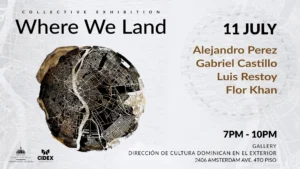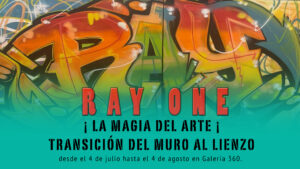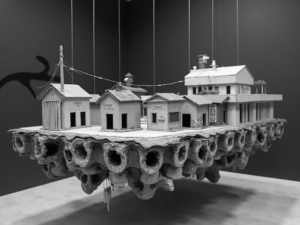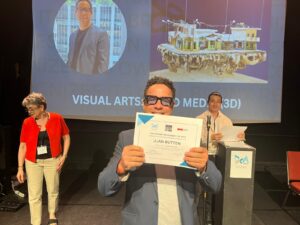In an ecosystem dominated by bachata, merengue, and dembow — rhythms that rule the musical imagination of the Dominican Republic — Óscar Chabebe stands out as an unconventional figure. His musical approach goes against the grain of these high-energy tropical genres. Born in the heart of the Caribbean, his sonic compass points toward more introspective and ethereal latitudes.
Chabebe doesn’t aim to fit in; he listens to his inner voice, guided by intuition, sensitivity, and a powerful creative drive. His music, hard to label, draws from many genres and cultures — not to pay tribute, but to forge a unique language. More than a genre, his work could be seen as a punk gesture — not in sound, but in attitude. Rebellion, social critique, and a fierce creative independence mark his path.
A multi-instrumentalist and visual artist, Chabebe has also proven his talent in the visual arts, standing out with his powerful collages. He recently participated in a group exhibition at the Portal Cultural in the Colonial Zone of Santo Domingo. This season, fans are in for a treat: in addition to his visual works, he’s releasing a new EP that promises to expand his sonic universe.
I had the pleasure of speaking with him about his music, creative process, and the local scene. Below is the full interview, offering a glimpse into the unique world of Óscar Chabebe, also known as Reptiles Reptiles.
Interview with Óscar Chabebe aka Reptiles Reptiles
By Juan Butten
1. Óscar, you were born and raised in the Caribbean, a place many associate with warm rhythms, lively percussion, and celebration. What led you to explore ambient music — such an introspective and ethereal genre?
Above all, the existence of Brian Eno and Jon Hassell. Also, commercial music has always struck me as extremely boring and predictable. Of course, there are exceptions and geniuses across all genres. But it’s like okra — if you hate it, you hate it. Also, the whole love and heartbreak theme feels like something that burned out in the Middle Ages. I don’t feel I have anything new to say about that.
2. Can you recall a specific moment or experience in your childhood that drew you toward this kind of sound?
Absolutely. I keep writing about those very experiences: the sound of car tires on the old George Washington highway heading toward Las Américas, my father at the wheel listening to Brazilian music on a seventh-generation cassette, the blue sea to one side, palm trees rushing by… Or the atmosphere in Andrés, Boca Chica, with cotton plants around, or the starry sky in Juan Dolio in the late ’80s and early ’90s. There was a beautiful silence back then, makeys dancing on the asphalt… I also remember the distant sound of palos that could be heard from my house in Arroyo Hondo every Holy Week — the ones from La Puya, and Cristo Rey. All of that is in my music.
3. Do you feel there’s something Caribbean in your music, even if it’s not obvious on the surface?
Absolutely. Simple Music alone contains merengue, gagá, and tropical bolero.
4. Tell us about your influences. What artists shaped your understanding of ambient music?
Brian Eno and Jon Hassell are foundational, of course. But honestly, I’m not an ambient scholar. I mostly listen to folk music from around the world. The Orb and early ambient records by Aphex Twin also blew my mind.
5. Are there Dominican artists or musical traditions that have influenced your work, directly or indirectly?
I played drums with José Duluc and Palo Nuevo. Duluc was a student of Luis Terror Días, who I consider such a unique force that no one else should even be placed in the same category. He’s a separate phenomenon. I’m still producing for Duluc, and we’ve got a few things in the works — not ambient, though. I always remember my friends Luis and Duluc when I compose. No matter the context, you never stop being from here. There’s a wisdom in that worth studying.
6. What’s your creative process like? Do you use field recordings, synthesizers, improvisation?
I like to work fast. I hate second takes or editing. Sometimes I start with a drum machine from a toy keyboard and record everything in one go. Then I add other layers from instruments that respond to the first one. There’s a lot of “architecture” in music, if you will. In my latest EP, El Fin de Santo Domingo, I used ambient recordings I captured for the short film Plaza Juan Barón. I use old gear, synths, guitar, bass, drums, melodica…
7. What role do silence or space play in your music? Would you say there’s something spiritual in it?
Everything. And yes.
8. What differences do you notice between making ambient music in the Caribbean versus in places where the genre has a stronger tradition?
I’ve only had one opportunity to do what I do outside this country — when EdgeZones invited me to Miami a few years ago. It was during COVID, so attendance was limited, but it was amazing. I visited several museums that inspired my collage work too. I knew I had done something right when I sent a recording of the performance to a Japanese friend and he said, “You can feel the city.”
9. Do you feel your geographical surroundings clash with or nourish your sonic identity?
Right now, I see ambient — and other electronic genres — as the Caribbean version of punk. The sonic culture here is chaotic and inattentive; ambient is quite the opposite.
10. How does your local community receive your musical proposal?
I don’t think more than 40 people in this country like my music, haha. But I get along well with them.
11. In your view, what could ambient music bring to the contemporary Caribbean?
Ambient could help counter the false, perverse, commercial image sold about this half-island — that everyone here just smiles and lives to please tourists.
12. What are you working on right now?
I’m recording some very lo-fi stuff using old Yamaha toy keyboards and kalimbas. I built a portable wooden station that lets me move around easily. I’m looking for unusual places to create — busy intersections, isolated spots… wherever inspiration strikes.
Óscar Chabebe is a much-needed anomaly in the Dominican sonic landscape. His music not only stretches the boundaries of what we call “Caribbean,” but also proposes a new way of inhabiting the world through sound: freer, more honest, and radically personal.









